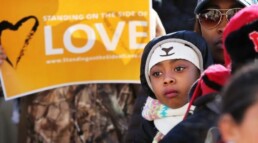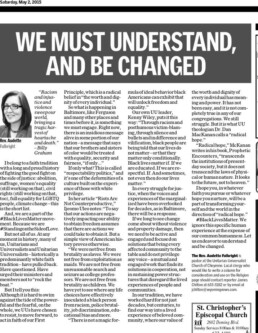Casper man reconnects with father’s civil rights past 50 years later

By JAMES CHILTON
March 15, 2015
Wyoming Tribune Eagle
CHEYENNE – Growing up, Steve Reeb never knew his father.
He knew of his father, of course – all his life, he had been told that the Rev. James Reeb was a hero, a martyr to the civil rights movement.
A Unitarian Universalist minister from Boston, the elder Reeb lost his life in Selma, Alabama, where he was fatally beaten by white segregationists. This was at the height of the Selma to Montgomery marches of 1965, when thousands of demonstrators walked the 54-mile highway from Selma to the Alabama state capital in support of equal voting rights.
James Reeb’s death on March 11, 1965, led to a national outcry against the Jim Crow laws of the South, and just days later, President Lyndon Johnson would convene a nationally televised joint session of Congress to address the need for the Voting Rights Act.
That historic bill would be signed into law five months later. But for Steve Reeb, then just 3 years old and living in Casper, the civil rights victory did little to fill the now-gaping hole in his life.
“As a young child, I knew what he did, and I knew what the results were,” Reeb said. “But when you’re a young boy, you’re dealing with questions like, ‘Who’s my dad? Who’s going to take me to play baseball?’ I just kind of swept it under the rug.”
For half a century, Reeb was quiet about his father’s life and legacy. But this year, the Cheyenne physician saw an opportunity to finally learn just who his dad was.
“I knew the 50th anniversary of Selma was coming up,” Reeb said. “My daughter would come home from school – she was 8 – and she would talk about Jim Crow laws, segregation in the South, and I said, ‘Oh my gosh, she doesn’t even know about her own grandfather.’
“At that point, I was compelled to go,” Reeb added.
And he wasn’t the only one. In all, 17 members of Reeb’s family made the trip to Selma earlier this month to take part in commemorating the 50th anniversary of the marches. The journey was as personal as it was educational, as Reeb was able to get in touch with some of his father’s personal friends and fellow activists.
Those included Unitarian pastors Clark Olsen and Orloff Miller, who survived the same assault that claimed James Reeb’s life. Olsen and Miller took Steve Reeb to the spot where the attack took place, walking him through the event.
“They met us at the site where they were walking out of the restaurant, and we took a right and started walking down the sidewalk,” Steve Reeb said. “They said they saw four or five guys coming out of a store across the street who came up behind them, and they told themselves to quicken the pace.”
One of the men yelled out a racial epithet, and then, Reeb said, “One of the pastors turned around just in time to see a man swing a club at my dad’s left temple. It was over in 30 seconds, and they ran.”
The Rev. Audette Fulbright, pastor of the Unitarian Universalist Church of Cheyenne, also was in Selma for the 50th anniversary. By coincidence, she had personally studied under Olsen in Asheville, North Carolina, and was familiar with the story of the attack on James Reeb.
“A lot was going on, and they couldn’t get emergency services,” Fulbright said. “The ambulance didn’t take them to the nearest hospital, it took them away.”
It was hours before James Reeb was admitted to a hospital in Birmingham, where he died two days after the assault. On March 15, the Rev. Martin Luther King Jr. gave a eulogy for Reeb at Brown’s Chapel in Selma.
“He demonstrated the conscience of the nation,” King said. “He was an attorney for the defense of the innocent in the court of world opinion. He was a witness to the truth that men of different races and classes might live, eat and work together as brothers.”
During his time in Selma, Steve Reeb also got the chance to speak with Ron Engel, who had been a personal friend of his father’s before the Selma marches.
“He gave us an account of the personal aspect, the humanistic side of my father that he knew two years before he was killed,” Reeb said. “He had written down quite extensive thoughts, and hearing his words was equally as important as hearing the Unitarian ministers describe the last walk.”
Both Reeb and Fulbright were present to mark the 50th anniversary of “Bloody Sunday,” when marchers were beaten by police as they attempted to cross Selma’s Edmund Pettus Bridge on March 7, 1965. But where only a few hundred marchers crossed then, Reeb and Fulbright were joined by tens of thousands of others.
“President Obama and his daughters, their crossing of the bridge shows the great progress that’s been made, while at the same time, there’s still so much work to do,” Fulbright said. “This is a pivotal moment in history, just like 1963 and 1965 – but also just like every day is. We are called as Dr. King was called, and we are called to the same exact work.”
For Reeb, the trip helped to bring closure to an issue he had left unresolved for half a century.
Seeing the crowds and speaking with the people who helped change history, he said he came away from Selma with a newfound appreciation of his father’s life, and the legacy that he and so many others have left for today’s America.
“It was huge because I’d been avoiding this thing for 50 years, and I wish I would’ve done it earlier,” Reeb said. “I can see enough change, and I can see enough people that know of him and know of what he was – what he fought for and believed in, and the courage it must take to come to Selma, a place from which you might not return.
“I’m very proud, along with all the other people who are proud of him too,” Reeb added. “You can never say it was just one person, but he did have a part. And I do understand the significance of it more.”
https://www.wyomingnews.com/news/casper-man-reconnects-with-fathers-civil-rights-past-50-years-later/article_4d5c01b7-e7b8-5954-8cc9-5283594ed000.html
Big Day
Arrived in Montgomery late last night, and now today is the day of getting registered and choosing – among all the hundreds of things going on in Birmingham, Montgomery, and Selma, what to do. Today will be a Twitter day for those of you who tweet – but I hope to write again tonight about today’s events. But first the drive to Birmingham (where the UUs are) and a prayer for parking.
So tired…but happy
Got less than 2 hours of sleep last night, so all the posting I wanted to do will have to wait. Unfortunately, I didn’t have any cell service in the hotel so could not do all the tweeting I had hoped! But spent most of the day with Opal Tometi, transnational Black feminist, co-founder of #BlackLivesMatter and the ED of the Black Alliance for Just Immigration – at her workshop Not One More Day of Inequality: Immigrant Justice, Racial Justice. Then I joined Chris Crass, UU & organizer, working to build “powerful working-class based, feminist, multiracial movements for collective liberation.” In a post below, you’ll note I purchased his powerful book Toward a Collective Liberation when I was at the seminal Teaching for Change bookstore Busboys & Poets in DC!! Chris gave us a solid overview of how to work Toward Justice:
* work from an ASSETS BASE
* be OPPORTUNITY ORIENTED (not extra critical/judgmental as UUs have a habit of being)
* take a DEVELOPMENTAL APPROACH – see what small steps you can build on
Tomorrow is going to remarkable – and a little difficult to navigate. But it will undoubtedly be better with some food and sleep in me.
Home Again – Family and Friends edition
I am back in Greenville, SC, where I grew up and where most of my family lives – my grandparents, my father, my brother and sister-in-law, my nieces, my step brother and sister….and lots of friends who knew me back when. WAY back when. Long before I was a minister, surely. Back when I had long blonde hair and usually went by the name Trixie Belden, or sometimes (quite randomly) “Daisy.”
It’s been deeply soul-satisfying to sit and chat with my grandparents and dad, and Ember & Matt when they were down. My grandparents built their house the year I was born. That was a long time ago. It’s still the absolute best place I know – the place where I feel the most at home, the place where the ground reaches up and gives me a hug, and the air is always sweet and earth-scented and greening. While here, I got to celebrate my grandmother’s 89th birthday with her. Ember and I brought a green tea and pomegranate cheesecake made by one of Ember’s baking compatriots. It was sweet and fleeting taste, like these moments, like the years.
There’s been the blessing, as well, of seeing my brother – who had a long, hard walk in the wilderness for many years, my friends – seeing him home and in love and well-settled. He and his wife have a nice house, pets, and he has a chance to be part of raising a really neat kid. He gets to cook and play drums and laugh and he’s just almost another person. He cooked for me this week, and he’s his mother’s kid through and through – boy, does he want to please you with food and how deeply he cares about getting it right and loving you with just the perfect meal. He did a glorious job, he and his wife. I very nearly licked the plate, and then we laughed and laughed as we played games until it was time for bed.
Meanwhile, one of my oldest friends awaited on the other side of downtown. In the years I’ve been away, Greenville has stretched and decided to become one of the most impressive cities in the country, and certainly in the South. Now with a nearly European air, it bursts at the seams with culture and flair and is an absolute food heaven. This is the same city that nurtured me into the deeply liberal and artistic woman I am, but lord – has it ever outdone itself. Glorious. Here are a few of the city views…
My good friend (we were besties when we were 7-9, and she was Nancy Drew to my Trixie Belden) and I had a great time, hanging out with her cool and artistic daughter, her 5 cats, her new guy, and some great Mediterranean food. Her fella reminded me of how fantastically fun it is to West Coast and East Coast swing, and then she and I discussed books and lamented how little real history of the civil rights struggle we’d been taught in school. She, like everyone else on m journey, was glad I was going to Selma. She’s waiting to learn more, even now, about the struggle.
Me, I’m moving on. Selma is closer every day. But god, do I miss home.
My Travels with Cats
So far, all the places I’ve been have been owned by cats. I’m very good with cats, fortunately. I have offered up the proper sacrifices in terms of blood and scratches, but I assure you, compared to the average Guest of Cats, it’s the bare minimum. I know how to make shy cats visit me and mean cats let me pet them. I am the cat whisperer.
So here are the cats I have visited:
In DC, I spent a couple of days in a lovely flat with Romeo and Rune. Romeo is a ginger long hair, and Rune a long hair muted tortoiseshell calico. Romeo lived up to his name quickly, and allowed me to romance him for most of the visit. Rune usually cuddled when she didn’t fully realize it was me – such as when I was sleeping.
Oh, these two cats have a housekeeper who just happens to be my very best friend since 7th grade.
I’m writing this post from a cat boarding house. There are three cats here, who require a staff of four to serve them properly. The smallest and least prepossessing of these is Bobbie, aka Tiny. She’s a cat.
 Bobbie, with her personal caregiver, to whom I gave birth.
Bobbie, with her personal caregiver, to whom I gave birth.
The largest is Booty. He has boots, but apparently was named after butts.
 The couch is very large. Booty takes up most of it.
The couch is very large. Booty takes up most of it.
The reigning king of the household is Tiberius. Also known as Tibs, also known as “argh, get off my face!” Tibs and I have spent a lot of time together, because he wishes it to be so.
Along the way, there have also been other cats, because, cats. My friends Rob and Erin have the most dynamic cat, which is another way of saying “evil.” Also beautiful, but definitely sharp-clawed youthful evil. I can’t remember evil kitty’s name, but I remain proud that I was able to ninja zir enough to pet. I bled the most at zir’s altar.
 I will make you bleed, but you will enjoy it, because – look at me.
I will make you bleed, but you will enjoy it, because – look at me.
The last cat was my friend Cathy’s cat. I almost didn’t see this one, because – well, she burrows. Here she is in her natural state, where I found her:
Cathy then decided her sheets needed to be changed, so she pulled Miss Nora out. Turns out she’s a chocolate point Siamese. Who knew?
 Cathy with the cat who is much bigger than her lump would lead you to believe.
Cathy with the cat who is much bigger than her lump would lead you to believe.
So, I m actually heading away from catcivilization tomorrow, which will just be weird. But one last photo, to remind you of the power and pain of visiting cats….my sacrifice to these lovely gods:
May all your travels have cats –
in faith –
Audette
Ethiopian, Thrift Stores, Poets & Busboys
First full day of the trip, and it couldn’t be better. First things being first, I’m with my best friend again – it’s been a while. And she’s back in our nation’s capitol, kicking tail and taking names, working in women’s international reproductive health. Just being around her is inspiring.
Fortunately, her local friends aren’t big into Ethiopian, so she didn’t hesitate when I asked f we could make our first food stop at one of DC’s finest. We had the buffet, which was good but not great – buffets usually aren’t as good as a la carte. Still, there’s barely such a thing as BAD Ethiopian food, and this definitely was not that! As for getting around, she’d picked me up from the airport in a ZipCar and we took Uber to the restaurant. The sharing economy is really convenient and affordable! The bus system is pretty fly in DC, as well.
After lunch, we almost passed the best thrift shop ever but a guy heading in said we should check it out. We did, and I found a great sweater I needed for less than $8. BF got a birthday present silky shirt for next to nothing.
Then we ducked in from the cold into Busboys and Poets, my dream spot. With its mission justice and change, it was hip, comfy, delicious and inspiring. I came out rehydrated with fresh pomegranate juice and with the fantastic world-changing books shown below. I also cameout determined to host some “A.C.T.O.R” sessions – A Continuing Talk About Race. Take a look at their other offerings here: www.busboysandpoets.com.
Next up: games and burritos. A perfect day.

Books from Learning for Change
Bumpy beginning
Things are off to a bumpy beginning. Snow and a nasty intestinal thing have set the schedule off by a day. Here’s hoping things smooth out soonest. Thank goodness SouthWest is a decent airline – and with the change, maybe I can get a ride from the airport…
On My Way

So, I’m heading out from Cheyenne, and the next 24 + hours will be transition time. I’m also on my daughter’s netbook so the keyboard is new and there are typos galore. Still, I look forward to bringing folks along on this journey. I hope it will be a good one.
Reflecting on King’s dream

By LUCAS HIGH
January 20, 2015
Wyoming Tribune Eagle
“I have a dream that my four little children will one day live in a nation where they will not be judged by the color of their skin, but by the content of their character.”
– The Rev. Dr. Martin Luther King Jr. in his famous “I Have a Dream” speech, delivered Aug. 28, 1963, in Washington, D.C.
The Rev. Martin Luther King Jr. famously hoped for a brighter future for American children of all races, and C.J. Brown’s family is proof that the spirit of King’s dream is alive and well in the Capital City.
Three generations of Brown’s family – including his daughter, Kim Brown, and grandson Xavier Puls – joined hundreds of others Monday to honor King with a march through downtown.
“It’s important for me, someone who was there and remembers the civil rights era, to be able to share this march with my family, with the younger generations,” said Brown, 66, a former member of the Cheyenne City Council.
“We have come a long way, but my fear is that our young people will forget about the struggle because they never really lived it. They inherited the opportunity to live in a world where blacks and white are together,” he said.
“I saw the civil rights struggle firsthand. (Kim) saw part of it, but she missed a lot of the pain of suffering. And (Xavier) has experienced it through the stories and the history. That’s why these marches are so important. If we fail to march and to keep this history and these stories alive, we will just go back to the old comfortable camps of whites with whites and blacks with blacks.”
Kim, 38, said, “I can honestly say there has been progress. I know when I was coming up, when I was (Xavier’s) age, it was very explicit that white was white and black was black and Mexican was Mexican. There was quite a bit of division.
“Living in Cheyenne all of my life, I’ve dealt with the good and the bad. But each year it’s gotten better. I’ll always be grateful for the equality that we can enjoy now. Martin Luther King and our civil rights leaders have sacrificed to allow for us to have the liberties that we have now.”
Kim said that during her lifetime, society has become much more accepting of interracial relationships and marriages, pointing to her 12-year-old multiracial son, Xavier, as evidence.
“When I was growing up, there were a lot of people that were taught to stick with their own (race), and that’s just the way it is. But there were others that were taught that there is a rainbow out there for a reason, and you have the right and the privilege to explore that rainbow now.”
Xavier credits the men and women of the civil rights era with making the society his generation inhabits a more accepting one.
“When Martin Luther King came, he changed everything. He made everything better,” he said. “He’s our savior. He brought all of us together so we don’t have to fight anymore.”
But Xavier accepts that not everything is perfect, and King’s dream of a country where the color of a child’s skin is irrelevant has yet to fully materialize.
“People will bring up my (multiracial background) at school, and I really don’t like it. There are a few kids at school that will tease me about what I am, what my color is. But I just try to ignore them.”
C.J. Brown said that while racial inequality and bigotry still exist, the most important issue isn’t white versus black, it’s rich versus poor.
“The real battle we face now is economic. There is still a struggle,” he said. “Whether you are black or white or from the (Native American) reservation, the struggle now is making sure you can make a living and provide a future for your kids.”
The speakers who addressed the crowd of more than 300 after Monday’s march from the Cheyenne Depot to the State Capitol echoed this sentiment.
“Dr. King died fighting the structures that hold people in poverty. Today, more people than ever have fallen below that (poverty) line, and income inequality is at record highs,” said the Rev. Audette Fulbright, pastor of the Unitarian Universalist Church in Cheyenne.
Sergio Maldonado, a representative of the Northern Arapaho Tribe in Wyoming, said the country is still struggling with economically “marginalized communities” of all races.
“Today, we have poor in America, and we have poor in Wyoming, and we have poor on the Wind River Indian Reservation,” he said. “But I believe we have ample room to grow and to make that better.”
https://www.wyomingnews.com/news/reflecting-on-kings-dream/article_786367ad-f993-59a9-9bfc-ccdea3914b50.html













